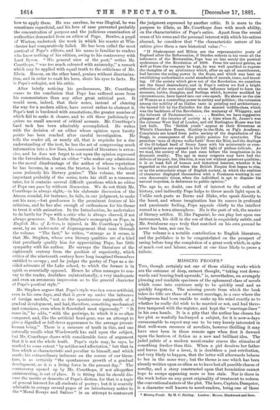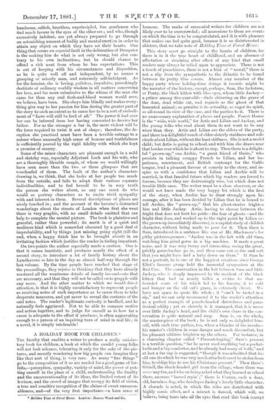MISSING PROOFS.*
THIS, though certainly not one of those abiding works which are the outcome of deep, earnest thought, " taking root down- wards and bearing fruit upwards," is, nevertheless, an averagely pleasing and readable specimen of the ephemeral class of novels which come into existence only to be quickly read and as quickly forgotten. The missing proofs from which the book takes its title are those of a secret marriage, in a case where the bridegroom had been unable to make up his mind exactly as to whether he really did wish to be married or not, and had there- fore tampered with the register, and kept the " marriage-lines " in his own hands. It is a pity that the author has chosen for her plot so woefully hackneyed a subject, for it is now-a-days unreasonable to expect any one to be very keenly interested in that well-worn resource of novelists, however thrilling it may have once been in those remote ages when first it dawned upon the horizon of fiction as a new and brilliant idea. The jaded palate of a modern novel-reader craves the stimulus of something fresher than this. When a girl deceives her father and leaves him for a lover, it is doubtless a just retribution, and very likely to happen, that the latter will afterwards behave to her in the same way ; but the theme is one which has been already written upon so often as to have lost all possible charm of novelty, and a story constructed upon that foundation cannot hope to escape appearing more or less stale. Nor is there in the work before us any great originality of treatment to redeem the conventional nature of the plot. The hero, Captain Dempster, is a character well known to novel-readers, being one of those • Missing Proofs. By M. C. Stirling. London: Messrs. Blackwood and Bons.
handsome, selfish, heartless, unprincipled, fine gentlemen who find much favour iu the eyes of the other sex ; and who, though excessively indolent, are yet always prepared to go through an astonishing amount of bodily and mental exertion in order to attain any object on which they have set their hearts. One thing that seems an especial fault in the delineation of Dempster is the making him do what is not only wrong, but also con- trary to his own inclinations, lest he should chance to offend a rich aunt from whom he has expectations. This is out of keeping with his circumstances and disposition, as he is quite well off and independent, by no means a grasping or miserly man, and extremely self-indulgent. As for the heroine, she is loving, guileless, impulsive, provokingly destitute of ordinary worldly wisdom in all matters concerning her love, and far more submissive to the whims of the man she cares for than any real flesh-and-blood woman would ever, we believe, have been. She obeys him blindly and makes every- thing give way to her passion for him during the greater part of the story to such an extent as to cause her to be a sort of embodi- ment of " Love will still be lord of all." The power it had over her can be inferred from her having consented to deceive her father. For as the stronger a bar is, the more violent will be the force required to twist it out of shape ; therefore, the de- ception she practised must have been a terrible outrage to a nature whose unusually high sense of honour and truthfulness is sufficiently proved by the rigid fidelity with which she kept a promise of secresy.
Some of the minor characters are pleasant enough in a mild and sketchy way, especially Adjutant Loch and his wife, who are a thoroughly likeable couple, of whom we would willingly have seen more than the two or three glimpses that are vouchsafed of them. The fault of the author's character- drawing is, we think, that she looks at her people too much from the outside, and fails to adopt their various separate individualities, and to feel herself to be in very truth the person she writes about, as any one must do who would so portray characters as to excite vivid sympathy with and interest in them. Several descriptions of places are nicely touched in ; and the account of the heroine's distracted wanderings about the streets of London when first she went there is very graphic, with no small details omitted that can help to complete the mental picture. The book is plaintive and graceful, rather than powerful ; its merit is of a quiet and mediocre kind which is somewhat obscured by a good deal of improbability, and by things just missing going right (till the end, when a happy finish has to be brought about) in an irritating fashion which justifies the reader in feeling impatient.
On two points the author especially needs a caution. One is that it seems inartistic, and produces nearly the effect of a second story, to introduce a lot of family history about the Lyndhavens so late in the day as almost half-way through the last volume. By the time people have reached that stage of the proceedings, they rejoice iu thinking that they have already mastered all the wearisome details of family ins-and-outs that are necessary, and that they will not be called on to grapple with any more. And the other matter to which we would direct attention, is that it is highly unsatisfactory to represent people as receiving notes of such importance as to cause them to take desperate measures, and yet never to reveal the contents of the said notes. The reader's legitimate curiosity is baulked, and he naturally feels aggrieved. Not to be able to compare motive and action together, and to judge for oneself as to how far a cause is adequate to the effect it produces, is often aggravating enough to a person of an inquiring turn of mind in real life ; in a novel, it is simply intolerable !











































 Previous page
Previous page